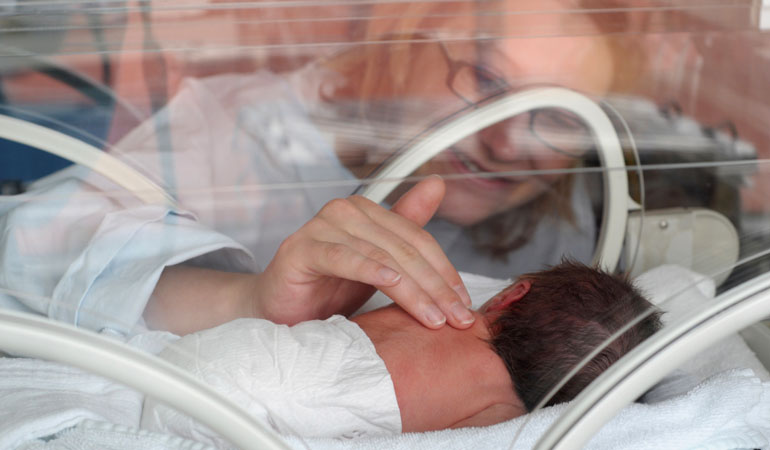In the United States, 8 to 10 percent of infants are born prematurely, and the figure is likely higher in adoptees, due to the prevalence of factors that lead to prematurity, such as lack of prenatal care and poor nutrition. Adoptive parents whose child was born prematurely, or at a low birth weight (LBW), are justifiably concerned about the medical conditions the child may face immediately after delivery, and medical and/or developmental problems in the future. While they appear tiny and fragile, preemies are surprisingly resilient. Most overcome their initial medical problems and enter their adoptive families with few lingering concerns. First, let’s define some terms (see “By the Numbers: Age and Weight” below for more detailed definitions).
- Premature Infant: Any child born prior to 37 completed weeks of pregnancy, measured from the birth mother’s last menstrual period.
- Low Birth Weight (LBW): A birth weight less than 2,500 grams (5 pounds, 8 ounces). Many countries placing children for international adoption lack the resources to determine gestational age accurately and use birth weight as an indicator of prematurity.
- Intrauterine Growth Restricted (IUGR): IUGR infants are those born with birth weights less than the tenth percentile compared to other babies at the same gestational age. Western nations and Korea are able to reasonably estimate IUGR. These infants may be healthy, but their growth was slowed due to potential maternal (malnutrition, hypertension) or fetal (prenatal exposure to drugs/alcohol or infections) factors.
For the sake of simplicity, in this article the term preemie refers to an infant in any of these three groups.
The NICU and Hospital Stay
Many acute problems can afflict preemies in the period shortly after birth, and most are admitted to a neonatal intensive care unit (NICU). Parents of these infants suddenly find themselves in a highly stressful situation. They wonder if their child will survive, and struggle to understand the technology, medical terminology, and their role in helping their child heal and grow. Parents adopting a premature baby have the added anxiety of parenting in limbo until the birth mother decides whether or not to terminate her parental rights.
Fortunately, NICU staff members know that caring for parents is just as important as caring for their child. A nurse will explain the technology and your child’s care plan, and the neonatologist, a pediatrician specializing in newborn intensive care, will discuss your child’s medical condition and answer your questions. Due to federal regulations regarding patient confidentiality, you’ll need either a preadoption custody order or the birth mother’s explicit permission for you to receive information and visit your child. If you run into access problems, talk to the NICU social worker.
Parents of preemies generally experience three phases during their child’s hospital stay. Initially, parents are intensely worried about survival. However, this phase usually passes quickly. Survival is highly likely once a child makes it through the first three to seven days of life.
As their infant’s medical condition stabilizes, parents begin to feel comfortable in the environment of an NICU. Feedings are established during this period. The ideal food for preterm infants is breast milk. While adoptive mothers can lactate, this is a difficult and lengthy process. Donor breast milk may be available, but preemies can also be fed formula. This is also the time when you begin to have regular contact with your baby. While parents are always welcome in the NICU, contact may initially be limited to touching and stroking your child in the isolette. During this phase, you can begin to hold your child and to provide skin-to-skin (kangaroo) care.
Once your child starts to gain weight, and medical issues are less prominent, you begin to anticipate discharge. This ushers in the third, and often most frustrating, phase. To be discharged, most preemies must 1) maintain their body temperature outside of an incubator, 2) take adequate nipple feedings every three to four hours by bottle, 3) gain weight consistently, and 4) remember to breathe. Some children catch on immediately and are discharged by 35 weeks gestational age, while others remain in the NICU until 38 to 40 weeks gestational age. Occasionally, an infant continues to have periods when he forgets to breathe (apneic spells), and requires home monitoring and medications, such as caffeine to stimulate his respiratory center. Other infants with chronic lung disease go home on supplemental oxygen. Don’t worry — your child won’t be discharged until you are trained and are confident about providing the care he requires.
Feeding and Daily Care
After discharge, avoid exposing your child to infectious diseases and tobacco smoke. Preemies are prone to respiratory infections in the first years of life, and are sometimes given a drug that will minimize the risk of contracting respiratory syncytial virus infection.
Preemies are seen by their doctors more often than full-term infants, until a normal growth and developmental trajectory is established. Your child should receive the usual immunizations, and your physician will discuss their schedule of administration with you.
Very few preemies need special nipples or bottles, but many are discharged on a special formula containing more protein, calcium, and phosphorous than standard formulas. Such formulas promote growth and bone mineralization, and may be continued well into the first year of life, depending on a child’s growth trajectory.
Long-Term Outlook
Your baby is now home, but what about the future? The long-term outcomes of preemies depend on several factors. A rule of thumb: The earlier in gestation, or the smaller a baby is, the higher the chances of ongoing medical and developmental problems. Outcome also depends on how ill a child is after birth and, for infants born abroad, the sophistication of medical care they have had.
Very low birth weight (VLBW) or very preterm infants have the highest risk of adverse outcomes. An analysis of multiple outcome studies, published in Pediatrics, in 2009, concluded that these children were at risk for moderate to severe deficits in academic achievement (math, reading, and spelling), and at a higher risk for attention problems, internalizing behavior problems (depression, anxiety), as well as deficits in executive function. Additional problems can include cerebral palsy or persistent lung problems, such as asthma, as well as hearing or vision loss.
For late preterm infants, which make up the majority of premature births (75 percent), outcomes are usually quite good. However, work published in Child’s Nervous System, in 2010, has identified a slightly increased risk over full-term infants for many of the long-term issues that affect very low birth weight/very preterm infants.
Some correction for prematurity is commonly used up to 24 months, to determine adjusted growth and development. Thus, the younger the baby, the more difficult it is to predict outcome. If a child is making good progress in developmental milestones during the first 12-24 months, growth is normal and hearing and vision unimpaired, we can be fairly optimistic that outcome will be favorable. However, we must often wait until school age to detect more subtle problems in learning, cognition, attention, and behavior. Preemies will be monitored through life for growth (shorter stature as an adult), subtle abnormalities in lung function, and a possibly higher risk of chronic diseases, such as hypertension.
Warning Signs
If your child was born abroad, and you have limited medical information, what are the warning signs of future problems? Sequential measurements are important, with compromised length and head circumference being the most important risk factors. Severe developmental delay is also a warning sign. A ratio of developmental age to chronological age (both corrected for prematurity) of less than 50 percent may indicate cerebral palsy or another neuromotor problem. Failure to show a social smile may indicate blindness, and failure to babble by 12 months may indicate hearing problems. Unfortunately, in addition to prematurity, severe neglect in orphanages adversely influences development and growth. Therefore, it’s important to seek a knowledgeable interpretation of your child’s medical records, ideally from a specialist in adoption medicine.
Parenting a Preemie
The environment in which a preemie develops is enormously important. Studies have found that parent education, child rearing by two parents (regardless of marital status), and stability in geographic residence and family composition over a 10-year-period positively impact school outcome in preemies. The Minnesota International Adoption Project surveyed more than 1,800 families whose children had been living with them for an average of seven years. When asked how the child’s medical and/or behavioral problems affected the family, parents of low birth weight infants were no more likely than parents of other children to report they were struggling to adjust.
While there are risks of ongoing medical, developmental, and behavioral problems, particularly for the smallest preemies, most of them experience normal growth and development during infancy and childhood. If a family sets appropriate expectations, knows their own abilities and the resources available, seeks appropriate consultation, and is cognizant of a premature child’s potential challenges, they can experience all the joys of parenting.





